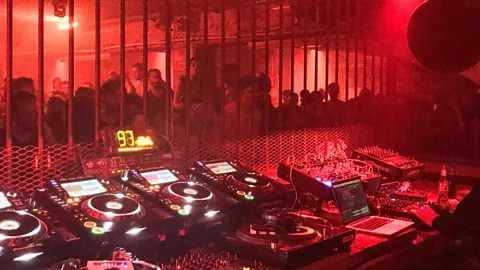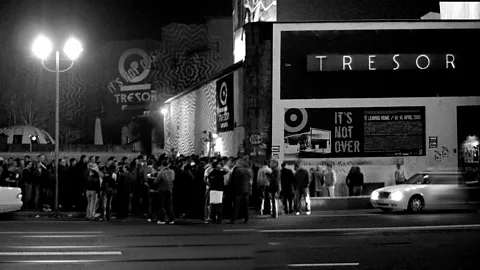How Berlin's techno scene transformed the city and gained Unesco status
 Dimitri Hegemann
Dimitri HegemannIn abandoned warehouses and squats of this once-divided city, young people thirsty for freedom started a cultural revolution that has now been recognised by Unesco.
Kingston has reggae, New York has hip-hop and Berlin has techno. This throbbing, electronic music style became the soundtrack of liberation following the fall of the Berlin Wall in 1989 and has remained synonymous with the city ever since.
Now, a cultural revolution that was sparked in the abandoned warehouses and communist-era squats of the once-divided city by young people thirsty for freedom has been recognised by Unesco and inscribed on the German national Registry of Intangible Cultural Heritage. The designation will allow techno clubs access to government funding and support – a much-needed asset as soaring rents have caused what's been dubbed locally as a "clubbing crisis".
Dimitri Hegemann was there for the birth of Berlin's techno boom. "I was there when the Wall came down," the activist and organiser told the BBC. "That was an incredible situation. It generated a very positive atmosphere in town. When the Wall came down everybody was open for something new." A towering figure in the city's clubbing scene since German reunification in 1990, Hegemann founded the now-world-renowned techno club Tresor in 1991 in the vault of an abandoned department store in East Berlin. In recent years, he has championed the movement to grant Berlin's club culture Unesco status, which was announced on 13 March 2024.
"For more than 30 years, techno has been an important sound of our capital, also for many people who come to Berlin from Europe and all over the world," said Claudia Roth, the Minister of State for Culture, in a statement. "For many years, Berlin's techno culture has stood for values such as diversity, respect and cosmopolitanism… [it] is part of the cultural wealth of our country, which is underlined by this inclusion in the list of Intangible Cultural Heritage."
Where to experience Berlin's techno culture
The decision comes after several years of lobbying by musicians and activists like Hegemann and the non-profit organisation Rave The Planet. Proponents of the designation say the city's techno scene was pivotal in transforming the former divided city into the bastion for liberalism and the arts that it is today.
"The techno scene has become a haven for those who don't necessarily see themselves being represented in the more traditional facets of the city's identity," said Jennifer Kucza, who was born in Poland and has lived in Berlin for many years. "Those involved in the scene have by now reached a status of somewhat of a subculture, with their belonging being reflected not only in the music but also a certain visual identity, lifestyle and even attitude."
When the Berlin Wall toppled in 1989, the city's empty buildings and low rents were flooded with young, artistic people and the ideas that came with them. Empty and abandoned buildings transformed into late-night (and early-morning) techno-driven raves, which became places to meet, dance and discuss new dreams for the future. The connections fostered in these makeshift clubs birthed a unique kind of grassroots entrepreneurship; art galleries, events and even restaurants began to pop up in parks, apartment squats and abandoned warehouses, like the one where Hegemann started Tresor.
"This movement has changed the DNA of Berlin," Hegemann said. "We have a lot of visitors in the clubs who decided to join this movement in the early '90s. They were motivated, encouraged to start a small business like a restaurant or an agency or something… all these ideas were decided in the clubs after 03:30 in the morning, you know?"
 Dimitri Hegemann
Dimitri HegemannMany of these locations and the newer clubs they've inspired have since become institutions, and the artistic and inclusive culture these clubs helped foster reflect Berlin's famous live-and-let-live ethos. Today, just as history buffs head to Rome and foodies flock to Paris, those seeking an inclusive club culture head to Berlin – so much so that the city's official website boasts about it.
The Unesco designation is particularly beneficial in helping to ensure that these long-standing cultural institutions remain a living part of the culture. In addition to allowing clubs to access government funding, the new designation means clubs will now have increased protections under town planning laws. Many of Berlin's famous clubs struggled during the Covid-19 pandemic, and factors like the city's rising rental costs, stagnant wages and high cost of operations, have continued to threaten their existence.
Hegemann hopes that the example set by Berlin's techno clubs is something that can be translated to other cities around the world.
"We think that people everywhere may want to do something [like this] in their own communities. If the politicians take it more seriously," he said. "It's important that decision-makers say, 'You are our future, we'll give you the space,' so that young creatives can develop something that could help their community."
--
Join more than three million BBC Travel fans by liking us on Facebook, or follow us on Twitter and Instagram.
If you liked this story, sign up for The Essential List newsletter – a handpicked selection of features, videos and can't-miss news delivered to your inbox every Friday.
